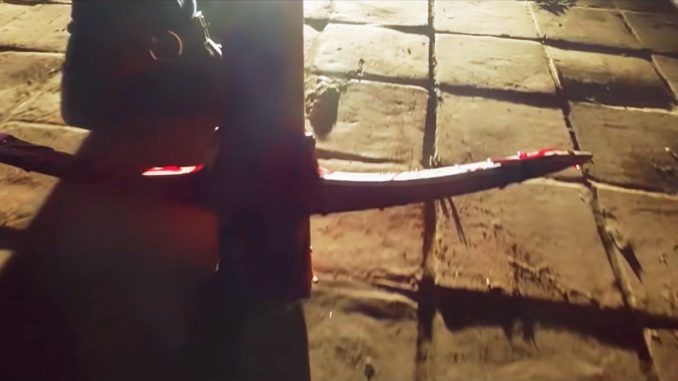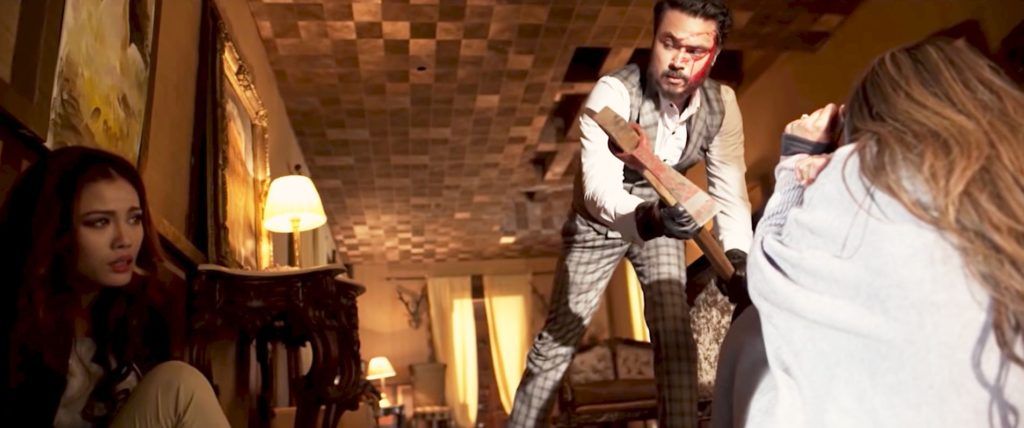
Rating: C+
Dir: Dinesh Raut
Star: Namrata Shrestha, Koshish Chhetri, Mala Limbu, Jebica Karki
A bit like the Baltic former Soviet states blur together, I have to pause a little to distinguish Nepal from Tibet. The latter isn’t a country though, being officially regarded as part of China (not that it wants to be). Nepal is close to the highest country in the world, its average altitude of 10,712 ft being only behind Bhutan, by about fifty feet. This will happen when you have Everest sitting on the border between you and China. That said, I was a little surprised by the lack of obvious Himalayas here. It’s mostly indoors, but the occasional outdoor shot seems to reveal nothing particularly mountain-shaped. I’m guessing it takes place in the capital and largest city, Kathmandu, which is at a much lower altitude, only about 4,600 ft above sea level.
Because of the capital’s name, the Nepali film industry is known as “Kollywood”. As you can imagine, it’s heavily influenced by its Indian neighbour, though is far smaller in terms both of productions and places where they can be seen. One estimate has there being about 40 Kollywood productions per year, but theatres have been suffering financially, due to taxes placed on them by the government, which can add as much as one-third to the cost of a ticket. As a result, the number of available screens has collapsed to a mere 150 nationwide. That’s a tiny number, considering the country’s population is over thirty million, and led to cinemas going on strike in February this year.
 Horror films are even fewer in number, though aren’t entirely unknown, with the supernatural and folklore seeming to be the most common source of material for their stories. Parva does manage to avoid any spooky shenanigans, with a more grounded approach – at least, relatively. The evil to be found here is entirely humanist in nature, though it’s another case where it feels like nobody involved has ever seen another film in the genre. It doesn’t help that the horror genre is perhaps the one least suited to having an incongruous musical number injected into the middle – yes, that happens – and the 116-minute running-time is longer than the material can sustain. However, it’s technically sound, and on occasion, everything comes together effectively.
Horror films are even fewer in number, though aren’t entirely unknown, with the supernatural and folklore seeming to be the most common source of material for their stories. Parva does manage to avoid any spooky shenanigans, with a more grounded approach – at least, relatively. The evil to be found here is entirely humanist in nature, though it’s another case where it feels like nobody involved has ever seen another film in the genre. It doesn’t help that the horror genre is perhaps the one least suited to having an incongruous musical number injected into the middle – yes, that happens – and the 116-minute running-time is longer than the material can sustain. However, it’s technically sound, and on occasion, everything comes together effectively.
The heroine is Ritu (Shrestha), who loses her phone after a night out clubbing – there’s an early shot of a bloodied pick-ax being dragged through the streets (top), though this seems present merely to set tone. The person who finds it calls her sister, Riya (Karko) off the contacts list, and brings the cell to the apartment they share with another young woman, Suman (Limbu). The findee is Manav (Chhetri), who invites Ritu to an event he’s having. She is stunned when she discovers that he’s the author of one of her favourite books, and the pair begin a relationship. This is where things get interesting. Or at least, could have got interesting, since there are a number of ways the story might potentially go, to confound expectations.
Spoilers follow, out of necessity. Things like the gory pick-ax indicate there is a psycho in the mix here, though initially the film is coy as to who it might be. Manav is the most obvious candidate, and he is suspiciously controlling. But a scene where Ritu wakes up in the middle of the night and is choking herself, suggest an alternative; it’d certainly have been a twist, had she been the wielder of the pick-ax. For a while, we suspected they might both be psychos which, again, would have been something novel, with them either teaming up, or facing off. However, the script here has absolutely no interest in originality, and desires only to follow slavishly the most banal of expectations. Because it is, indeed, Manav who is the mad killer here.
The reasons for this are explained in a lengthy (largely unnecessary) flashback, and involve him catching his mother cheating on his father. This led him to wield his pick-ax with enthusiasm, setting a tone for his life since. Indeed, there’s a little Basic Instinct at play here, with Manav weaving his genuine experiences of murder into his literary works. His father, however, is increasingly concerned about his son’s erratic behaviour, and so is Riya, after communications with her sister are abruptly cut off. Her efforts to investigate Ritu’s sudden disappearance do not go well, and it’s left up to Suman, the sole remaining resident of their flat. Guess she needs to see what happened to her house-mates, to figure out if she needs to place a “Room to let” advert.
 Her search leads to a finale which, again, unfolds exactly as you’d expect, in line with horror tropes. For instance, Suman whacks Manav once across the head… and leaves him lying there on the floor. No prizes for guessing whether or not he comes back to pose a further threat. If either of the women had shown a modicum of common sense, this extended sequence would have been over in two minutes. That said, I won’t deny, it was still fun to watch and had at least one well-executed false jump scare. Director of photography Rajesh Shrestha – no clue if he is related to the lead actress – has a good eye generally, and even when the story isn’t holding your attention, the visual side is quite impressive.
Her search leads to a finale which, again, unfolds exactly as you’d expect, in line with horror tropes. For instance, Suman whacks Manav once across the head… and leaves him lying there on the floor. No prizes for guessing whether or not he comes back to pose a further threat. If either of the women had shown a modicum of common sense, this extended sequence would have been over in two minutes. That said, I won’t deny, it was still fun to watch and had at least one well-executed false jump scare. Director of photography Rajesh Shrestha – no clue if he is related to the lead actress – has a good eye generally, and even when the story isn’t holding your attention, the visual side is quite impressive.
There are occasional moments which are a little embarrassing. For example, when Suman finds a certificate stating Manav received treatment for depression. Firstly, who knew they gave out diplomas? Secondly, it goes on, “Now we are releasing him for his better social life in future, but Manav should not stop taking pshyostimulant (sic) to control his emotional level.” I laughed like a drain at that. There’s potential here, and with less slavish devotion to the obvious, it could have been an unexpected gem. I did appreciate the attempt to avoid all the usual Asian genre cliches, of vengeful ghosts, etc. Just a pity it’s considerably less successful at avoiding all the usual Western genre cliches.
This review is part of our October 2024 feature, 31 More Countries of Horror.
